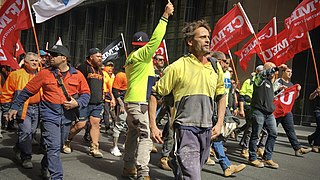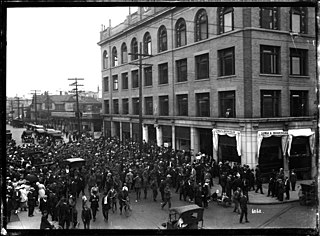Related Research Articles
Labour laws, labour code or employment laws are those that mediate the relationship between workers, employing entities, trade unions, and the government. Collective labour law relates to the tripartite relationship between employee, employer, and union.

Strike action, also called labor strike, labour strike in British English, or simply strike, is a work stoppage caused by the mass refusal of employees to work. A strike usually takes place in response to employee grievances. Strikes became common during the Industrial Revolution, when mass labor became important in factories and mines. As striking became a more common practice, governments were often pushed to act. When government intervention occurred, it was rarely neutral or amicable. Early strikes were often deemed unlawful conspiracies or anti-competitive cartel action and many were subject to massive legal repression by state police, federal military power, and federal courts. Many Western nations legalized striking under certain conditions in the late 19th and early 20th centuries.
Collective bargaining is a process of negotiation between employers and a group of employees aimed at agreements to regulate working salaries, working conditions, benefits, and other aspects of workers' compensation and rights for workers. The interests of the employees are commonly presented by representatives of a trade union to which the employees belong. A collective agreement reached by these negotiations functions as a labour contract between an employer and one or more unions, and typically establishes terms regarding wage scales, working hours, training, health and safety, overtime, grievance mechanisms, and rights to participate in workplace or company affairs. Such agreements can also include 'productivity bargaining' in which workers agree to changes to working practices in return for higher pay or greater job security.
In labor law, a union shop, also known as a post-entry closed shop, is a form of a union security clause. Under this, the employer agrees to either only hire labor union members or to require that any new employees who are not already union members become members within a certain amount of time. Use of the union shop varies widely from nation to nation, depending on the level of protection given trade unions in general.

The Canadian Labour Congress, or CLC is a national trade union centre, the central labour body in Canada to which most Canadian labour unions are affiliated.
The Federal Public Sector Labour Relations and Employment Board is an independent quasi-judicial tribunal that administers the collective bargaining and "grievance adjudication systems" in Canada's federal public service and in Parliament.
The Canada Labour Code is an Act of the Parliament of Canada to consolidate certain statutes respecting labour. The objective of the Code is to facilitate production by controlling strikes & lockouts, occupational safety and health, and some employment standards.

The Canadian Union of Postal Workers is a public-sector trade union representing postal workers including letter carriers, rural and suburban mail carriers, postal clerks, mail handlers and dispatchers, technicians, mechanics and electricians employed at Canada Post as well as private sector workers outside Canada Post. Currently, comprising upwards of 50,000 members, the Canadian Union of Postal Workers has historically been labeled as militant because of some of the actions undertaken since its inception in 1965 to help guarantee rights to all postal workers. According to former president Jean-Claude Parrot, "We succeeded to get the support of the membership because we earned our credibility with them...we got that reputation [of militancy] because we earned it."

A strikebreaker is a person who works despite an ongoing strike. Strikebreakers may be current employees, or new hires to keep the organization running. In continuing to work, or taking jobs at a workplace under current strike, strikebreakers are said to "cross picket lines".

Canada v Paul L'Anglais Inc. et al. [1983] 1 S.C.R. 147 is a leading Supreme Court of Canada constitutional decision on the jurisdiction of the superior courts to hear constitutional arguments. The unanimous court found that courts of inherent jurisdiction such as the Quebec Superior Court had concurrent jurisdiction to hear constitutional cases.

Toronto Electric Commissioners v Snider is a Canadian constitutional decision of the Judicial Committee of the Privy Council where the Council struck down the federal Industrial Disputes Investigation Act, precursor to the Canada Labour Code. The Court identified matters in relation to labour to be within the exclusive competence of the province in the property and civil rights power under section 92(13) of the Constitution Act, 1867. This decision is considered one of the high-water marks of the council's interpretation of the Constitution in favour of the provinces.

Ontario Hydro v Ontario (Labour Relations Board), [1993] 3 S.C.R. 327, is a leading constitutional decision of the Supreme Court of Canada on the federal declaratory power and the peace, order and good government power under the Constitution Act, 1867. The Court held that the regulation of relations between Ontario government and employees of a nuclear power plant was under federal jurisdiction under the federal declaratory power of section 92(10)(c) of the Constitution Act, 1867, and the national concern branch of the peace, order and good government.

Canadian labour law is that body of law which regulates the rights, restrictions, and obligations of trade unions, workers, and employers in Canada.

Labor relations or labor studies is a field of study that can have different meanings depending on the context in which it is used. In an international context, it is a subfield of labor history that studies the human relations with regard to work in its broadest sense and how this connects to questions of social inequality. It explicitly encompasses unregulated, historical, and non-Western forms of labor. Here, labor relations define "for or with whom one works and under what rules. These rules determine the type of work, type and amount of remuneration, working hours, degrees of physical and psychological strain, as well as the degree of freedom and autonomy associated with the work." More specifically in a North American and strictly modern context, labor relations is the study and practice of managing unionized employment situations. In academia, labor relations is frequently a sub-area within industrial relations, though scholars from many disciplines including economics, sociology, history, law, and political science also study labor unions and labor movements. In practice, labor relations is frequently a subarea within human resource management. Courses in labor relations typically cover labor history, labor law, union organizing, bargaining, contract administration, and important contemporary topics.

The Industrial Disputes Act, 1947 extended to the whole of India and regulated Indian labour law concerning trade unions as well as Individual workman employed in any industry within the territory of Indian mainland. Enacted on 11 March 1947 and It came into force 1 April 1947. It was replaced by the Industrial Relations Code, 2020.
The Wartime Labour Relations Regulations, adopted under the War Measures Act on 17 February 1944, were introduced in Canada during World War II by the government of Prime Minister William Lyon Mackenzie King. Drafted loosely on the American Wagner Act, it was the first federal legislation in Canada to legally protect the formation of unions and to force employers to negotiate with organized workers. It was a foundational framework for legislation of union rights in Canada. The provisions of the order were later replicated by Acts of all the provincial legislatures.

The Department of Post-Secondary Education, Training and Labour is a department in the Government of New Brunswick responsible for "ensuring the New Brunswick workforce is competitive by making strategic investments in people through innovative programs, services and partnerships." The Department oversees the province's public universities and colleges, the provincial student loan system, public libraries, labour, adult learning and literacy, as well as immigration. There are a number of Acts under the Department's legislative purview, including New Brunswick's Employment Standards Act, Workers' Compensation Act and Human Rights Act. Several arms-length agencies and Crown corporations report to the Legislative Assembly of New Brunswick through the Minister responsible for the Department, such as the Labour and Employment Board, the Human Rights Commission, WorkSafeNB and New Brunswick's community colleges.

NIL/TU,O Child and Family Services Society v BC Government and Service Employees' Union is a leading Supreme Court of Canada constitutional law case dealing with jurisdiction over labour relations in the context of federalism and Aboriginal rights.
A police union is a trade union for police officers. Police unions formed later than most other occupations, reflecting both a conservative tendency and relatively superior working conditions. The first police unions formed in the United States. Shortly after World War I, the rising cost of living, wage reductions, concerns over amount of rest and growing dissatisfaction among rank and file police officers led to a number of police strikes from 1918–1923 and the formation of police unions globally.
The 2024 Canada railway dispute was a labour-business dispute between the Canadian National Railway Company (CN) and Canadian Pacific Kansas City (CPKC) and the Teamsters Canada Rail Conference that shut down the freight railway operations of both railway companies. The shutdown also included passenger trains operating on CPKC tracks, but not passenger trains running on CN tracks. The shutdown began on August 22, when CN and CPKC locked out over 9,300 employees.
References
- 1 2 "Jurisdiction of the CIRB". Canada Industrial Relations Board. October 2, 2017. Retrieved February 3, 2018.
- ↑ "Members". www.cirb-ccri.gc.ca. 2023-02-07. Retrieved 2024-12-17.
- ↑ "Government of Canada announces appointments to the Canada Industrial Relations Board". Employment and Social Development Canada, Ottawa, Ontario. Canada.ca. January 12, 2018. Retrieved February 3, 2018.
- ↑ "Artists and Producers–Status of the Artist Act". Canada Industrial Relations Board. April 3, 2013. Retrieved February 3, 2018.
- 1 2 "Board's Role". Canada Industrial Relations Board. April 4, 2013. Retrieved February 3, 2018.
- ↑ "No. 06–Unlawful Strikes and Lockouts—Information Circular". Canada Industrial Relations Board. April 3, 2013. Retrieved February 3, 2018.